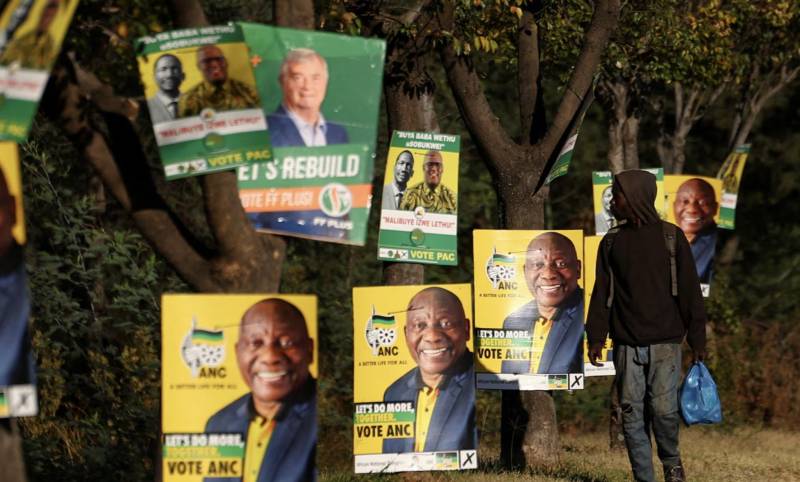
South Africans went to the polls on May 29, in what is widely being hailed as the most important election in the country’s recent history. Early results indicate that the ruling African National Congress (ANC) could lose for the first since it ascended to power after the end of apartheid in 1994.
Out of a total population of nearly 62 million, 28 million people are eligible to vote. South Africa is plagued by chronic unemployment, increasing inequality, power cuts and corruption – all of which have diminished support for the ANC. The ANC has won all national elections since 1994, when Nelson Mandela became the country’s first ever Black president.
South Africa’s lower house of parliament, called the National Assembly, comprises 400 members – allocated proportionally to parties that receive the highest votes. In the 2019 elections, where the ANC won 57.5% of the vote, it held 230 seats, followed by the Democratic Alliance (DA) opposition that received 20.77% of the vote and held 84 seats. There are a total of 52 political parties on the national ballot.
It must be remembered that South Africans don’t directly vote for a President. The elected members of the National Assembly elect the President.
Even though the ANC has held power since apartheid ended in 1994, many expect that a coalition government could be a possibility for the first time. Final results for the polls are expected on Sunday.
If the ANC is re-elected, Cyril Ramaphosa, 71, the current head of the ANC, could serve out another 5-year term as President. The right-leaning Democratic Alliance’s leader John Steenhuisen, has campaigned on a promise to ‘rescue South Africa’ from the ANC. Another major competitor is the pan-Africanist, Marxist Economic Freedom Fighters (EFF), led by Julius Malema.
The South African government’s support for Palestine has been a common feature in the election campaign, and expressions of solidarity with the people of Gaza have been common. The Democratic Alliance opposition is the only mainstream party that has not supported the government’s decision to take Israel to the International Court of Justice (ICJ), accusing the Jewish state of genocide in Gaza, and has been widely criticized for its “neutral” stance on Israeli aggression in Gaza.
Former ANC leader Jacob Zuma, 82, is barred from running, but he is the leader of the newly formed uMkhonto we Sizwe (MK) party, whose name harkens to the ANC’s paramilitary wing during the apartheid era, founded by Nelson Mandela in the 1960s. Zuma was forced to step down as President after a host of scandals emerged in 2018, which lead to him falling out with the ANC leadership.
The ANC’s standing among ordinary South Africans has fallen sharply over the last decade, owing to rising youth unemployment and frequent power cuts, but it is still expected to be the single largest party in this election. It might not however, manage to cross the 50% threshold needed to attain a majority in the National Assembly. If the ANC does not manage to gain the votes needed for a majority, it will have 14 days from the announcement of the election results to cobble a coalition together.
The Democratic Alliance is expected to win a little over 20% of the vote, with the Economic Freedom Fighters likely to get approximately 12 or 13%.
The key demographic that will decide this election’s result is the youth, many of whom were born after apartheid ended, which is key in explaining why they do not feel a sense of loyalty to the ANC. The country’s struggling economy, rising crime and corruption add to the palpable sense of disgruntlement that South Africa’s young people feel. Nearly 1 in 3 South Africans is unemployed, with the country having the highest official unemployment rate in the world, at nearly 33%. Youth unemployment is higher, at 44%.
Voters above 40 remember apartheid, when Black South Africans did not have many human rights, and feel a sense of attachment to the ANC as the party that gave them liberation and equality.
That deep sense of loyalty from voters, particularly in rural South Africa, might not be enough to save the ANC's majority. On Thursday afternoon, with nearly 20% of the results tallied, the ruling party's share of the vote stood at 43.4%, with the opposition Democratic Alliance on 24.8%.
